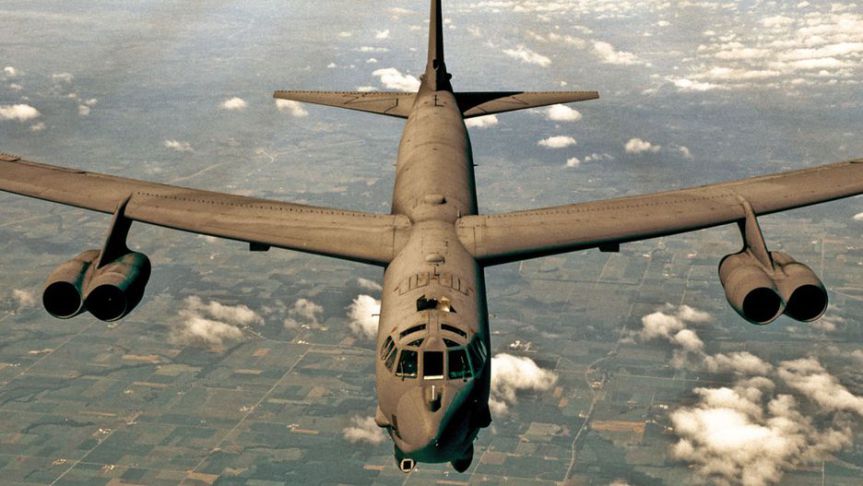 B-52s against drug labs. Really?
B-52s against drug labs. Really?
W.J. Astore
Here’s a New Year’s resolution: How about ending America’s quagmire wars?
There are many reasons why Afghanistan, Iraq, and similar countries will always be quagmires for the U.S. military. U.S. troops have difficulty identifying friend from foe, and indeed “friendly” troops and police sometimes turn on their U.S. counterparts. U.S. troops will always be a foreign presence, heavily armed and invasive, often (mis)guided by incomplete or misleading intelligence. Almost inevitably, they are seen as backing corrupt and kleptocratic governments, whether in Kabul or Baghdad. At the same time, U.S. bombing and search and destroy missions kill innocents even as they generate refugees—and new enemies. Under such violent and tumultuous conditions, you can forget about winning hearts and minds or creating lasting political stability.
Facing this no-win scenario, savvy U.S. leaders would pull troops out immediately, but of course pulling out is never an option. Whether it’s Bush or Obama or Trump, the preferred “solution” to unwinnable quagmires is to “surge” (more troops, more airpower, more “advisers,” more weaponry) or to dither with tactics. Old theories are trotted out, such as pacification and counterinsurgency and nation-building, dressed up with new terms and acronyms such as asymmetrical warfare, the gray zone, MOOTW (military operations other than war), and VEOs, or violent extremist organizations, known to most people as terrorists.
The mentality among America’s generals is that the war must go on. There must be a can-do way to defeat VEOs in the grey zone using asymmetrical warfare while engaged in MOOTW. Thus B-52s, those venerable strategic bombers from the early Cold War era, are now being used in Afghanistan to “asymmetrically” destroy drug laboratories associated with Taliban funding, yet another instance of the U.S. military swinging a sledgehammer to kill a gnat.
After 16 years, if you’re calling in B-52s to flatten small drug labs, this is not a sign of impending victory. It’s a sign of desperation — a sign of a totally bankrupt strategy.
The same is true of the use of MOAB in 2017. It’s not a sign of strength to use such blockbuster bombs on an undeveloped country like Afghanistan. It’s a sign of desperation. Of having no coherent strategy. Of throwing munitions at the wall and seeing which one makes the biggest boom.
Of course, a key aspect of this is domestic politics. The target of B-52s and MOABs isn’t always the Taliban and similar VEOs. It’s American public opinion. For Trump, it’s like, “See? We used MOAB. We’re using B-52s. Obama didn’t do this. We’re tougher–better–stronger. We’re taking the gloves off.”
When America’s military is not taking metaphorical gloves off, it’s learning to eat soup with a knife. That’s the title of Lieutenant Colonel John Nagl’s book on counterinsurgency, abbreviated as COIN in military circles. A decade ago, Nagl worked with General David Petraeus to rewrite the book on COIN, which enjoyed a brief renaissance during the Iraq and Afghan surges. But COIN methods (the idea of killing or otherwise neutralizing guerrillas/terrorists/VEOs while winning the hearts and minds of the people) haven’t worked to clean up American-made messes in those countries, a result contained within the metaphor. For if you really want to eat soup, best to put away military knives, pick up the soup bowl, and slurp away.
But America’s warfighters, with their affinity for knives, persist in efforts to develop new and “better” ones (spoons are for wimps!) as they flail away in various soup bowls (or, if you prefer, Petri dishes, which was General John Nicholson’s, the U.S. commander in Afghanistan, “bowl” of choice to describe the Af-Pak region in his testimony to Congress in 2017).
To use a different soup metaphor, too many cooks spoil the broth. The U.S. military’s interventions—its various and varying recipes for success, the ingredients of which are almost exclusively violent—never add up to a palatable product.
William S. Smith put it well in a recent article for The American Conservative. American military interventions, Smith notes, driven in large part by COIN theory, mostly ignore local history, religion, and culture. The resulting quagmire, according to Smith, is predictable:
The fact is that all political order at all times and everywhere emerges from an extremely complex set of unique symbols, practices, and beliefs that are rooted in history, culture, and religion. Political order does not merely flow from safety and the protection of property but out of a cultural inheritance that provides citizens with a sense that their society embodies something larger than themselves. To them, the symbols and traditions of their society reflect a certain divine order. An invading army from a foreign civilization will always be seen as a threat to that order whether citizens embrace violence or not. Without a major revolution in culture an occupying army will be in no position to generate more than a skin-deep and transitory political reconciliation. (Emphasis added)
Call it COINfusion followed by defeat. The U.S. military tried the “occupying army” part of this with its various surges in Iraq and Afghanistan, and the political results were as Smith says: skin-deep and transitory. The “new” American approach seems to be a variation of Richard Nixon’s Vietnamization policy of turning the fight over to the “indigenous” peoples, whether Afghans, Iraqis, etc. while continuing to bomb, to supply weaponry, and to provide training and “advice” with U.S. boots on the ground. Such an approach is sold to the American people as staying the course to victory, with the exact terms of “victory” left undefined.
But what price “victory”, even an illusory one? A staggering one. By the end of fiscal year 2018, America’s post-9/11 wars will have cost the taxpayers nearly $5.6 trillion, notes the “Cost of Wars” project at Brown University. With U.S. generals speaking of “generational” wars, this enormous burden will only continue to grow in the future—unless we wise up.
So my New Year’s resolution for 2018 is simple. End quagmire wars. Bring the troops home. After all, what’s wrong with saving blood and treasure?
Share this:




